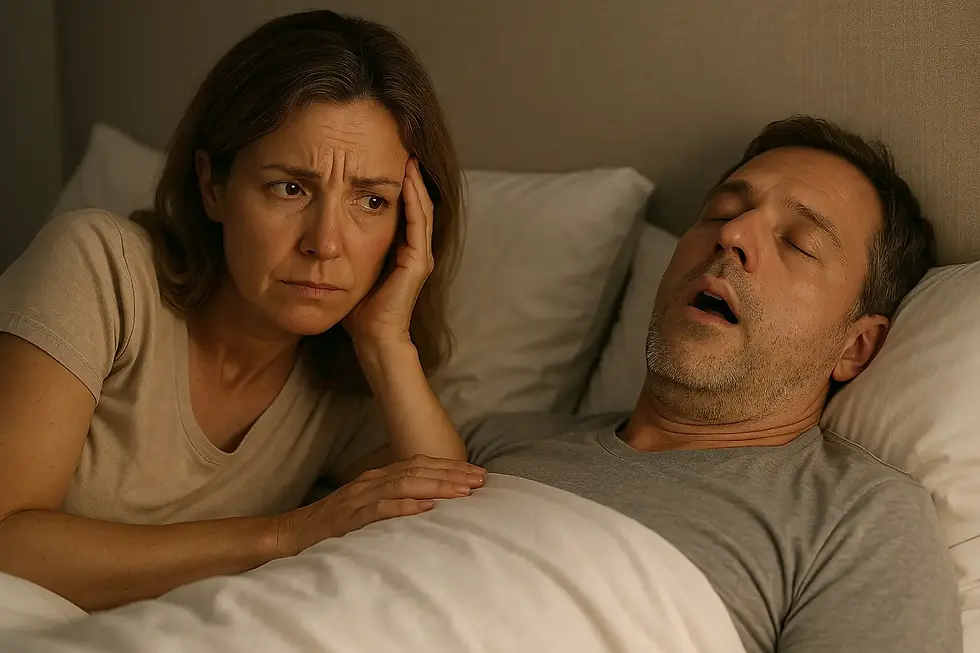Sleep Apnea Myths, FAQs, and Bite-Sized Facts: Your Easy Guide
- Saket Agarwal
- Aug 10, 2025
- 3 min read
Sleep apnea is common, but it's also misunderstood. Misconceptions stop people from seeking help or scare them from effective treatments.
Here’s a compelling, shareable blog designed to bust myths, answer top FAQs, and deliver bite-sized facts that empower every reader.
🚫 Top 7 Myths About Sleep Apnea — Debunked!
Myth 1: Sleep apnea is just loud snoring.
Fact: Not all snorers have sleep apnea, and not all with sleep apnea snore. The real concern is pauses in breathing during sleep, which are dangerous even without snoring.
Myth 2: Only overweight or older people get sleep apnea.
Fact: While extra weight and age are risk factors, sleep apnea affects children, women, and fit individuals too.
Myth 3: Using a CPAP/BiPAP machine is uncomfortable and only for severe cases.
Fact: Modern devices are quieter, comfortable, easy to use—and help people with even mild or moderate sleep apnea sleep and feel better.
Myth 4: I’d know if I had sleep apnea because I’d wake up gasping.
Fact: Many never realize their breathing stops at night. Symptoms like morning headaches, tiredness, forgetfulness, or mood changes are common signs.
Myth 5: Surgery is the only cure for sleep apnea.
Fact: Most people improve with a combination of therapy, equipment, and lifestyle adjustments. Surgery is rarely the first solution.
Myth 6: Sleep apnea is harmless and just part of aging.
Fact: Untreated sleep apnea increases risk of heart disease, stroke, diabetes, and accidents.
Myth 7: If I sleep alone, I don't need to worry.
Fact: You may still have sleep apnea and not know it. Listen to your body! If you’re always tired, get checked.

Frequently Asked Questions (FAQs)
Q1: How can I tell if I have sleep apnea at home?
A1: Look for signs like excessive daytime sleepiness, morning headaches, night sweats, waking up feeling unrefreshed, or if friends/family notice you stop breathing at night. A sleep study (at home or lab) is the gold standard for diagnosis.
Q2: Is it safe to use a CPAP or BiPAP at home?
A2: Yes. With proper training and equipment support, most people easily adapt to home therapy. Modern machines record and optimize your breathing patterns.
Q3: Can children have sleep apnea?
A3: Yes! Watch for symptoms like bedwetting, hyperactivity, restless sleep, or behavioral issues.
Q4: Can lifestyle changes cure sleep apnea?
A4: Losing weight, quitting smoking, and sleeping on your side can reduce symptoms—but many still need equipment or other therapies for best results.
Q5: Is sleep apnea just about feeling tired?
A5: Far from it. Untreated, it can damage your heart, brain, and overall health—even if you “get used to” being tired.
🍀 Bite-Sized Facts
25%–30% of Indian adults are at risk for sleep apnea.
Treated sleep apnea can improve memory, mood, and energy levels within weeks.
Proper machine use lowers high blood pressure and risk of heart attack.
Most insurance covers sleep apnea devices and therapy if prescribed by a doctor.
There are travel-friendly and portable solutions for your lifestyle.
Share & Take Action
If you or someone you know:
Snores loudly
Wakes up tired
Struggles with focus or memory
...it’s time to get checked.
Healthy Jeena Sikho can help with sleep studies, equipment rental or purchase, easy home setup, and ongoing support.
Let’s make good sleep—and good health—possible for everyone.Have more questions?
Comment below or contact our experts (+91-9876978488 available 24X7) for personal advice!
Stay tuned for more bite-sized health guides and myth-busting facts in our next post.



I was diagnosed with COPD four years ago. For over two years, I relied on inhalers and several other medications, but unfortunately, the symptoms kept getting worse. My breathing became more laboured, I experienced frequent coughing fits, and my energy levels started to decline quickly. Last year, out of desperation and hope, I decided to try an herbal treatment program from NaturePath Herbal Clinic. Honestly, I was skeptical at first, but within a few months of starting the treatment, I began to notice real changes. My breathing became easier, the coughing subsided, and, incredibly, my energy returned. It’s been a life-changing experience. I feel more like myself again better than I’ve felt in years. If you or a loved one…
excellent post with interesting facts on sleep apnea.